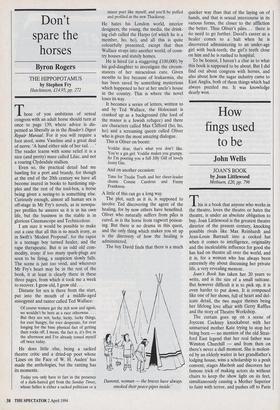Don't spare the horses
Byron Rogers
THE HIPPOPOTAMUS by Stephen Fry Hutchinson, £14.95, pp. 272 Those of you ambitious of sexual congress with an adult horse should turn at once to page 139, where advice is dis- pensed as liberally as in the Reader's Digest Repair Manual. For it you will require a foot stool, some Vaseline and a great deal of nerve. 'A hand either side of her tail. The reader learns with some relief it is a nice (and pretty) mare called Lilac, and not a roaring Clydesdale stallion.
Even so, the practical detail had me bawling for a port and brandy, for though at the end of the 20th century we have all become inured in books to hardening nip- ples and the rest of the tool-box, a horse being given a seeing-to is something else. Curiously enough, almost all human sex is off-stage in Mr Fry's novels, as in newspa- per profiles he assures us it is in his own life, but the business in the stable is in glorious Cinemascope and Technicolour.
I am sure it would be possible to make out a case that all this is so much irony, as in Swift's 'Modest Proposal', for the rapist is a teenage boy turned healer, and the rape therapeutic. But is an odd old com- modity, irony: if too many spark-plugs are seen to be firing, a suspicion slowly falls. The scene is just too vivid, and wherever Mr Fry's heart may be in the rest of the book, it at least is clearly there in these three pages, from which it took me a week to recover. I grow old, I grow old . . .
Distaste for sex is there from the start, put into the mouth of a middle-aged misogynist and ranter called Ted Wallace:
Of course women get the itch now and again, we wouldn't be here as a race otherwise. .. - But they are not, lucky, lucky, lucky things, for ever hungry, for ever desperate, for ever longing for the base physical fact of getting their rocks off. I mean, the fact is, it's five in the afternoon and I've already tossed myself off twice today.
He does little else, being a sacked theatre critic and a dried-up poet whose 'Lines on the Face of W. H. Auden' has made the anthologies, but the ranting has its moments.
Today you only have to fart in the presence of a dark-haired girl from the Sunday Times, whose father is either a sacked politician or a
minor poet like myself, and you'll be puffed and profiled as the new Thackeray.
He hates his London world, interior designers, the young, the media, the drink- ing club called the Harpo (of which he is a member, ho, ho), and all this is quite colourfully presented, except that then Wallace strays into another world, of coun- try houses and stately homes.
He is hired (at a staggering £100,000) by his god-daughter to investigate the circum- stances of her miraculous cure. Given months to live because of leukaemia, she has been saved by something mysterious which happened to her at her uncle's house in the country. This is where the novel loses its way.
It becomes a series of letters, written to and by Ted Wallace, the Holocaust is cranked up as a background (the lord of the manor is a Jewish refugee) and there are characters called Max Clifford (ho, ho, ho) and a screaming queen called Oliver who is given the most amazing dialogue.
This is Oliver on booze: Voddie dear, that's what you don't like. You're a gin girl. Voddie makes you grumpy. So I'm pouring you a full Jilly Gill of lovely Jenny Gin.
And on another occasion:
Time for Trudie Truth and her cheer-leader chums Connie Candour and Fanny Frankness.
A little of this can go a long way.
The plot, such as it is, is supposed to involve Ted discovering the agent of the healing, for by now others have benefited. Oliver who naturally suffers from piles is cured, as is the horse from ragwort poison- ing. But there is no drama in this quest, and the only thing which makes you sit up is the discovery of how the healing is administered.
The boy David finds that there is a much Dammit, woman — the braves have always smoked their peace-pipes inside.' quicker way than that of the laying on of hands, and that is sexual intercourse in its various forms, the closer to the affliction the better. Thus Oliver's piles. . . there is no need to go further. David's career as a healer comes to a halt when he is discovered administering to an under-age girl with buck-teeth; the girl's teeth close on him and he is rushed to hospital.
To be honest, I haven't a clue as to what this book is supposed to be about. But I did find out about congress with horses, and also about how the sugar industry came to East Anglia, both of them things which had always puzzled me. It was knowledge dearly won.


























































 Previous page
Previous page